
St Mary's Church, Handsworth, also known as Handsworth Old Church, is a Grade II* listed Anglican church in Handsworth, Birmingham, England. Its ten-acre (4 hectare) grounds are contiguous with Handsworth Park. It lies just off the Birmingham Outer Circle, and south of a cutting housing the site of the former Handsworth Wood railway station. It is noteworthy as the resting place of famous progenitors of the industrial age, and has been described as the "Cathedral of the Industrial Revolution".

St. James' Roman Catholic Church is located at 32 James Street between St. James Place and Madison Street in the Two Bridges neighborhood of Lower Manhattan, New York City. It is the second oldest Roman Catholic building in the city, built in 1835–1837 of fieldstone, with a pair of Doric columns flanking the entrance. While the neo-classical church is modeled on the published designs by Minard Lefever, and is sometimes attributed to him, there is no hard evidence of this being true. The building was once topped by a domed cupola.

J. W. Walker & Sons Ltd is a British firm of organ builders established in 1828 by Joseph William Walker in London. Walker organs were popular additions to churches during the Gothic Revival era of church building and restoration in Victorian Britain, and instruments built by Walker are found in many churches around the UK and in other countries. The firm continues to build organs today.

Charles Lloyd was a pipe organ builder based in Nottingham who flourished between 1859 and 1908.
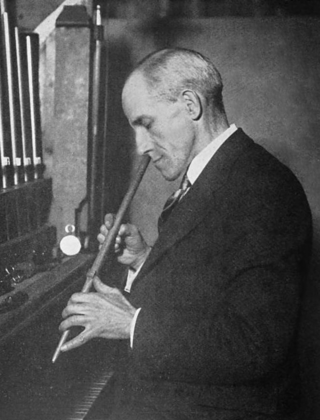
John Haywood Compton (1876–1957) was an English pipe organ builder. His business based in Nottingham and London flourished between 1902 and 1965.

James Jepson Binns was a pipe organ builder based in Leeds, West Yorkshire, England.
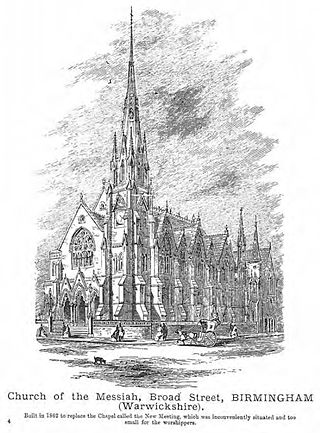
The Church of the Messiah, Birmingham was a Unitarian place of worship on Broad Street. The impressive Victorian Gothic church was constructed between 1860-1862 and straddled the Birmingham Canal. The congregation pre-dates the building, and has continued following its demolition in 1978. Those who worshipped there include politicians of local and national importance.
Bishop Ryder Memorial Church, Birmingham, was a parish church in the Church of England in Birmingham from 1838 to 1960.

St Alban the Martyr, Birmingham is a Grade II* listed Church of England parish church in the Anglican Diocese of Birmingham. It is dedicated to Saint Alban, the first British Christian martyr.

St Saviour's Church, Saltley is a Grade II listed parish church in the Church of England in Birmingham.
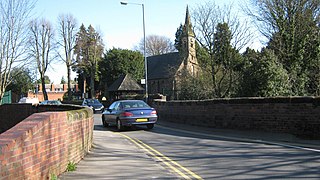
Christ Church, Yardley Wood is a Grade II listed parish church in the Church of England in Birmingham.
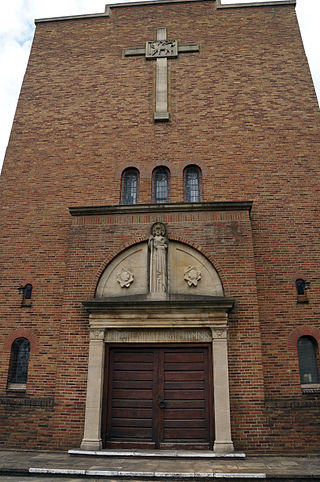
Christ Church, Ward End is a Grade II listed parish church in the Church of England in Birmingham.

Carrs Lane Church, also known as The Church at Carrs Lane is a church in Birmingham and is noted as having the largest free-standing cross in the country.
Immanuel Church, Birmingham, later known as St Thomas and Immanuel, Birmingham was a Church of England parish church in Birmingham.
St Barnabas’ Church, Ryland Street, Birmingham is a former Church of England parish church in Birmingham.
St Cuthbert's Church, Winson Green is a former Church of England parish church in Birmingham.

St Margaret's Church is a Grade II listed former Church of England parish church in Ward End, Birmingham, in the county of the West Midlands.
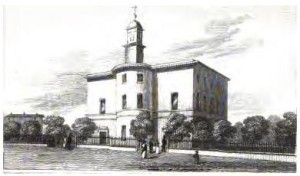
St James the Less’ Church, Ashted was a former Church of England parish church in Ashted, Birmingham.
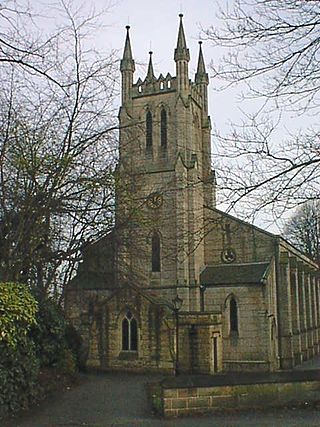
Holy Trinity Church, Chesterfield is a Grade II listed parish church in the Church of England in Chesterfield, Derbyshire.
















